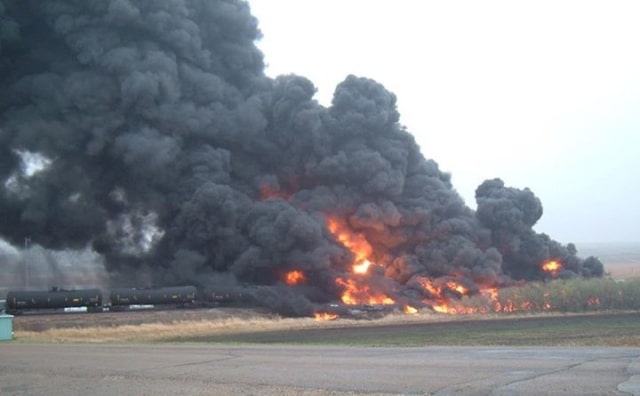An oil train derailment and subsequent fire early this morning near Heimdal, a rural town in central North Dakota, has led to the evacuation of nearby residents. The Associated Press reports that the accident occurred at 7:30am and that ten tanker cars of a BNSF Railway train were burning, “creating thick black smoke.” There are no reports at this time of anyone having been hurt in the explosion or its aftermath.
Firefighters and hazardous materials teams have been sent to the scene, and a team of investigators from the Federal Railroad Administration (FRA) is expected to arrive by mid-day, while the Environmental Protection Agency is reportedly sending someone to monitor nearby waterways for contamination, per the AP.
BREAKING via @ourcarbon: Yet another #fracking #oiltrains fire in #NorthDakota http://t.co/xJvDRl9QNM #Bakken pic.twitter.com/iEEdCapQ0Z
— EARTHWORKS (@Earthworks) May 6, 2015
FRA Administrator Sarah Feinberg told the AP that “the accident was ‘yet another reminder’ of the need for changes that have been resisted by the oil industry, which says it will take years to get the unsafe tank cars replaced or off the tracks.”
This is the first oil train accident in North Dakota since the state adopted new oil train regulations that were widely criticized as being insufficient to prevent further accidents. Writing here on DeSmogBlog, Justin Mikulka said that, “New regulations purported to make Bakken crude safer for transport instead allow business as usual for the oil and rail industries moving explosive Bakken crude oil in unsafe DOT-111 rail cars.”
The tanker cars involved in today’s oil train derailment and fire will not be phased out by the new regulations until 2023.
Jennifer Lewis, a local resident who posted on Facebook that she lives half a mile from the scene of the accident, told NBC News, “I was in the house at 7:15 a.m. when we thought we heard thunder… It was kinda awesome. It’s kinda scary to hear it. It was like fireworks going off. You could hear little explosions going off. I sat there for 15 minutes and you could hear it going off.”
this morning about a half mile from my home…
Posted by Jennifer Willis on Wednesday, May 6, 2015
According to NBC, “Nearly 450,000 tankers of crude moved through North America last year, up from just 9,500 in 2009.”
In a statement sent to DeSmog, Earthjustice attorney Kristen Boyles responded to the news of today’s oil train accident by calling for the Department of Transportation to implement stronger regulations on oil trains that take effect immediately:
“Again another derailment and explosion of a train carrying crude. Again another community evacuated and its people counting their blessings this didn’t happen half a mile down the track in the middle of town. Under the Department of Transportation’s new rules, the type of oil tank cars that are burning in Heimdal will stay on the rails for five to eight years. DOT’s new industry-pleasing rule is too weak and too slow. We need to get these exploding death trains off the tracks now.”
Update (1:16pm Pacific): Reuters reports that “In a statement confirming the accident, BNSF said the tank cars involved were unjacketed CPC-1232 models, which the new rules will render obsolete within five years.”
But this is not true. As DeSmog has documented, those particular train cars will not be phased out by the new regulations for 8 years.
According to a Reuters photographer on the scene, “Black smoke was visible for miles as more than 300,000 gallons of crude oil burned.” There is a chance emergency responders will just let the fire burn itself out, per Reuters.
Updated (3:40pm Pacific): There were initial reports that some oil from the derailed tanker cars got into the Big Slough, an intermittent waterway alongside the train tracks that flows into the James River 15 miles from the site of the accident, according to the Guardian. But “it will be difficult to verify until the fire dies down and officials can get closer to the scene,” state environmental health chief Dave Glatt told the paper.
Jeff Zent, a spokesman for North Dakota Governor Jack Dalrymple, says that the train was “hauling Bakken oil loaded in the Tioga,” the Guardian reports, but little more is known about the history of the Bakken crude involved at this time.
KSTP reporter Eric Chaloux appears to have confirmed that the plan is to let the fire burn itself out:
Latest on #ND #oiltrain derailment from Wells County Official–the plan is to just let the fire burn out. Some residents allowed back home.
— Eric Chaloux (@EChalouxKSTP) May 6, 2015
Update (05-07-15 4:45 Pacific): Reuters reports that the crude oil in the cars that derailed and exploded was less volatile than the new state laws adopted last month require:
Test results sent to federal investigators and seen by Reuters show the state’s new rule may not be stringent enough to significantly reduce the risks of fireballs after derailments of trains carrying crude. In this crash, the crude on board contained about 20 percent fewer volatile gases than regulations mandate.
The oil, transported in tank cars owned by Hess Corp, had a vapor pressure of 10.83 psi, according to test results. This pressure is less than the new threshold of 13.7 psi.
State regulators have used vapor pressure as a proxy for measuring the amount of flammable gases known as light-ends that are present in crude.
Image Credit: Facebook user Jennifer Willis
Subscribe to our newsletter
Stay up to date with DeSmog news and alerts






